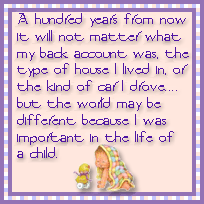WHEN IT COMES TIME FOR A CHILD TO RETURN
This can be the most difficult time in foster parenting. The child has usually been living with you for approx. 18 months. The older children are easier to let go of from my view. It's the babies that rip out your hearts. You have cared for this baby from the worst point in their lives; they usually come into your home looking for the most point like a rag doll. You watch them blossom into a real kid. You have changed all the diapers; you have wiped all the runny noses. You have brought them through the colds and the teething. You have watched and help them learn to crawl then walk. They spoke their first words to you, and they probably were MOMMY and DADDY. They have spent the majority of their lives in your home being a part of your family; they have visited their birth parents probably one to two hours a week, that is the only time they have spent with them. This time was spent in an office playroom; the parents were probably fighting with the caseworkers the whole hour they were to spend with their baby. The child has not really had the opportunity to bond with them. For the most part the parents don't really know how to bond with the child. The child can have some pretty scary memories of these visits. They sometimes have bad reactions from visiting their parents. Nightmares, diarrhea, fevers, clinging to the foster parents when they return from the visit. If you have a good worker they will take note of what is happening, and make some changes in the visits. Such as talking with the parents and explaining to them what the child is going through. The worker then can remove her self from the visit time for the most part; she can just pop in and check on the parents. This will remove the conflict between them and the parents, resulting with the parents giving the child more attention. (Without the stress) If the parents have been doing the tasks given to them and they seem to be doing pretty good, the worker can give them more visits, such as two visits a week. Then they can ease the visits into the parent’s home. (If parents are complying) This will give the child a better opportunity to bond with the parents they will go back with.
Some times the child hasn't had the chance to bond, so it is more difficult to return. This can be repaired. The child needs to feel it ok with the foster parents to go see the birth parents. If at all possible the foster parents need to interact with the birth parents. This will be extremely hard on the foster parents emotionally, but it is the best for the child. The first overnight visit will be the worst, the foster parents will probably think of all the worst things that could happen the child that they have kept alive for the last year and a half. This is where faith helps allot. When the child comes home it will probably be having even worse reactions. This is to be expected. It will get better.
The thing the foster parent needs to remember is that they took in this child knowing that it was temporary. They didn't know they would fall in love with the child. The thing to keep in mind is when this child goes home it will be time to take in another child who looks like a rag doll and needs their love and care. They will never forget the child they have sent home. This child will forever be in the hearts of the people who loved and cared for it.
WHAT IS THE EMOTIONAL PROCESS OF FOSTER PARENTING
When you get the phone call from your worker about a child who needs to come into your home, you get a sudden rush of adrenalin. You start thinking of the possibilities of what this child will look like, how big will it be, what will the emotional state of this child be like. Just what has this child gone through. You start to figure out what clothes you will need, where will the child sleep, what will the child be eating. If it is a baby you will have many questions. Diaper size, pj size what will you run out and but that night to get you through the next week or so. You try and prepare for the child to get to your home. Some times you have to wait for the child’s worker to call you about when they can bring the child to your home. You call your husband at work and alert him to what he will come home to; the children are all excited about the new arrival. When the child gets to your home it is real strange the feeling that take place. The first thing you do is change it's diaper and evaluate the clothing. The worker explains to you the visit schedule for the parents. She may also inform you a little more about the child’s past and what has brought them into the system. Everyone seems to want to hold the child and look it over like a new toy. The first half hour seems like two minutes long. After the worker leaves you sit and relax with the child to try and make eye contact with them. At this point the child can have chosen a favorite person he prefers to be held by. You sit back and imagine what could be going through this child’s mind. "Where am I and how long will I am here for?” The rush you get from a new child coming into your home can sometimes have a similar effect of an addiction high. It's a thrill you can only come to terms with when it has been a while between new children, then you get that call. Everything the first night after the child arrives is chaotic. The next morning things seem to settle in. Then it's time to set back and watch what this child does and can do.
Thursday, April 28, 2005
Subscribe to:
Post Comments (Atom)

















No comments:
Post a Comment